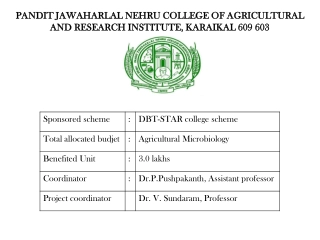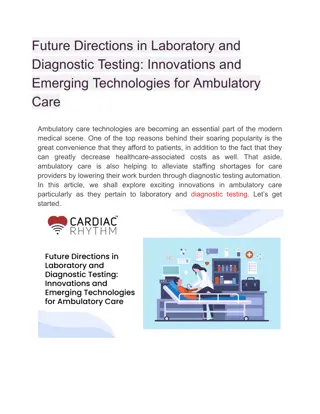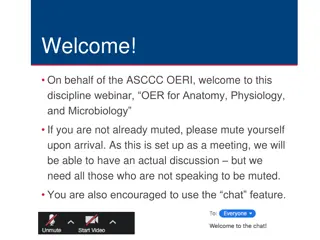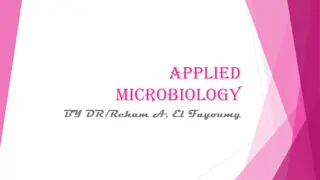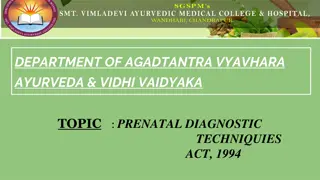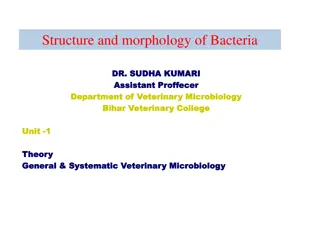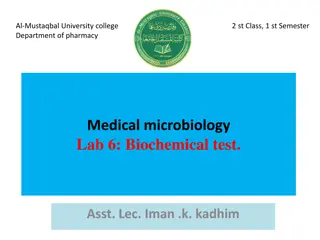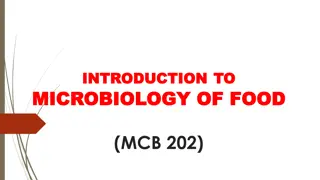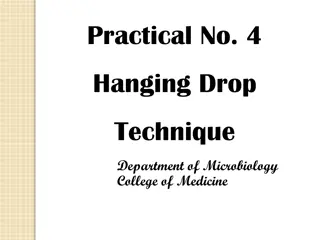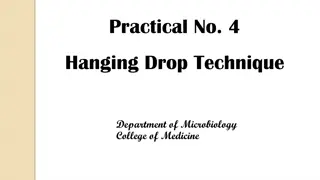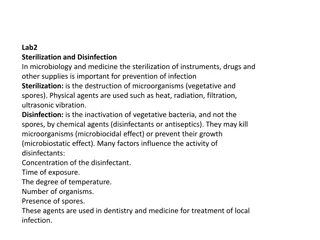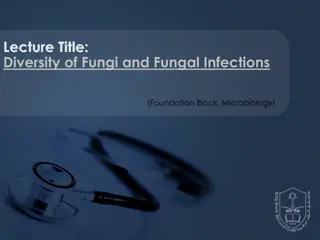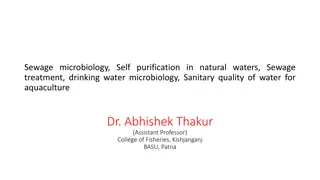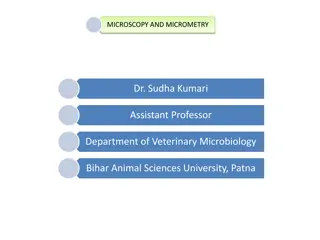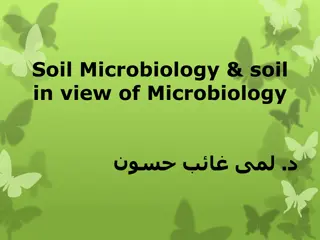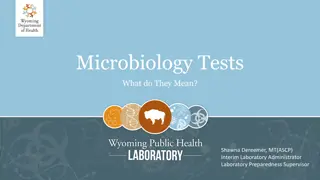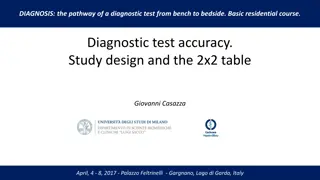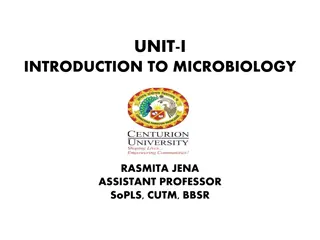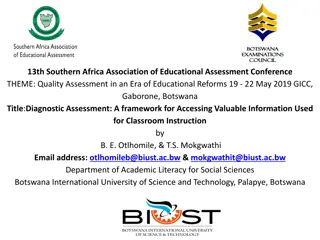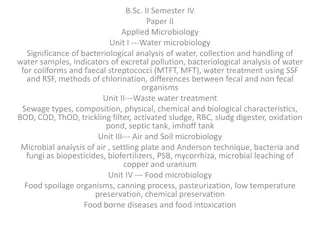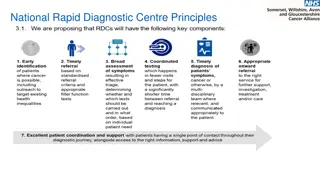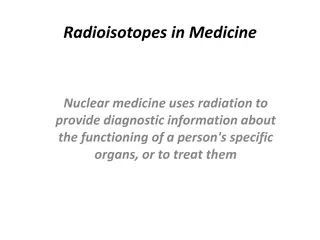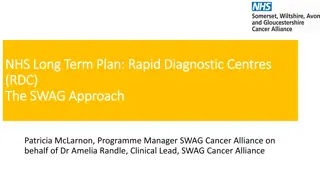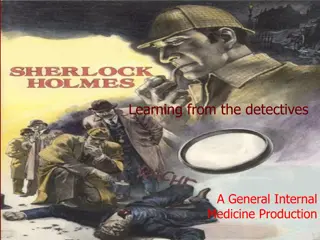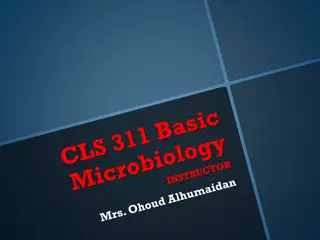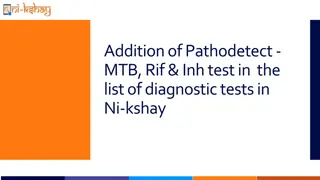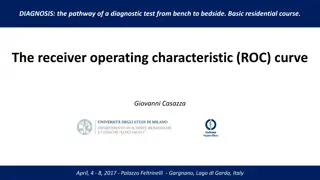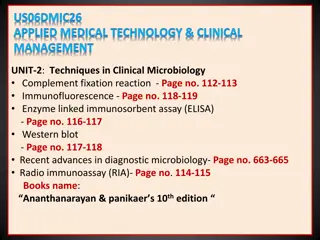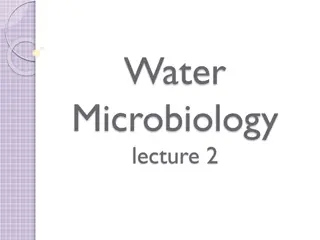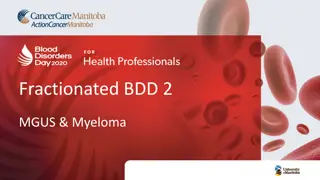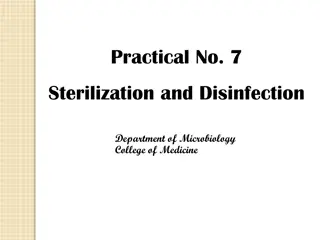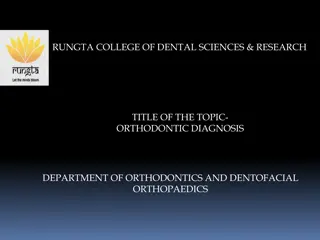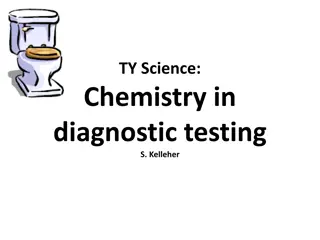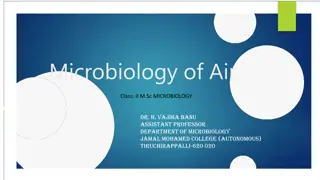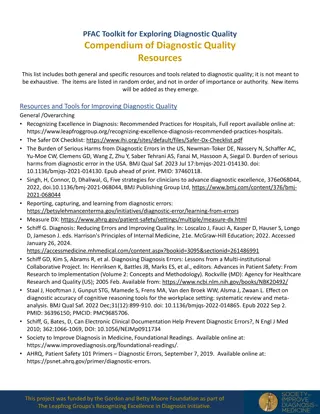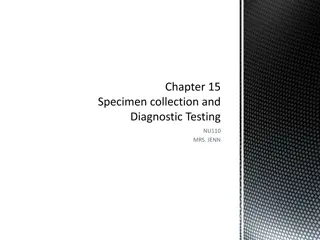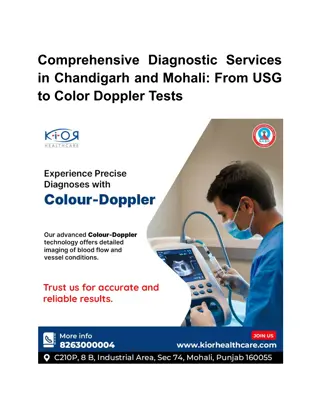Enhancing Agricultural Microbiology Education
The Pandit Jawaharlal Nehru College of Agricultural and Research Institute in Karaikal has been supported by the DBT-STAR college scheme to improve facilities, student exposure visits, introduce new practicals, and enhance faculty development in agricultural microbiology. Key Performance Indicators
0 views • 23 slides
Understanding Diagnostic Test Evaluation and Performance
Explore the intricacies of evaluating diagnostic tests, including precision, sensitivity, specificity, and factors influencing test performance. Learn about the purpose of diagnostic tests, examples across various fields, and the types of studies used to assess them.
9 views • 53 slides
Future Directions in Laboratory and Diagnostic Testing_ Innovations and Emerging Technologies for Ambulatory Care
Ambulatory care technologies are becoming an essential part of the modern medical scene. One of the top reasons behind their soaring popularity is the great convenience that they afford to patients, in addition to the fact that they can greatly decrease healthcare-associated costs as well. That asid
12 views • 5 slides
ASCCC OERI Webinar on OER for Anatomy, Physiology, and Microbiology
Welcome to the ASCCC OERI webinar focused on Open Educational Resources (OER) for Anatomy, Physiology, and Microbiology. This event discusses the adoption of OER in California Community Colleges, challenges faced in Anatomy and Physiology, available resources, and potential strategies to increase OE
0 views • 20 slides
Understanding Applied Microbiology: Insights into Microbial Diversity and Cell Organization
Applied Microbiology focuses on harnessing the capabilities of microorganisms for the production of beneficial products like medicines, vaccines, and biotechnological advancements. This field explores the intricate interactions between prokaryotic and eukaryotic organisms, emphasizing their pivotal
0 views • 23 slides
Understanding the Prenatal Diagnostics Techniques Act of 1994 in India
The Prenatal Diagnostic Techniques Act of 1994 in India aims to curb female foeticide and address the dwindling sex ratio by prohibiting prenatal sex determination. This legislation regulates diagnostic methods, prevents sex selection, and focuses on detecting genetic disorders, metabolic abnormalit
0 views • 15 slides
Overview of Bacterial Structure and Morphology in Veterinary Microbiology
Bacteria are single-celled prokaryotic organisms with a simple body design. Their structure includes layers such as the extramural layer, surface appendages like flagella and pili, cell envelop with a cell wall and cytoplasmic membrane, and cytoplasmic inclusions. The capsule and slime layer play es
0 views • 21 slides
Microbiology Lab Tests for Identifying Bacterial Pathogens
Learn about key biochemical tests like the Coagulase Test, Catalase Test, and Oxidase Test used in medical microbiology to identify pathogenic bacteria such as Staphylococcus aureus. Understand the methods, significance, and interpretation of results for each test.
2 views • 17 slides
Understanding Microbiology of Food and Foodborne Diseases
This introduction delves into the world of microbiology in relation to food, exploring key terms such as foodborne diseases, food hygiene, contamination, and more. It covers crucial concepts like toxic-infection, carriers, pathogens, and vectors, shedding light on the importance of food safety pract
1 views • 32 slides
Introduction to Hanging Drop Technique in Microbiology
The hanging drop technique is a method used in microbiology to observe living microorganisms suspended in a fluid under a microscope. This technique allows for the examination of motility and morphology of bacteria, providing valuable information for research and analysis. By creating a wet mount us
0 views • 17 slides
Microbiology Study: Hanging Drop Technique in Department of Microbiology, College of Medicine
In the Department of Microbiology at the College of Medicine, the Hanging Drop Technique is utilized to study live microorganisms. This technique involves suspending microorganisms in fluid on a hollow ground slide, allowing for observation of their morphology under a microscope. By creating a wet m
0 views • 8 slides
Sterilization and Disinfection in Microbiology and Medicine: Importance and Methods
Sterilization and disinfection are crucial in preventing infections in microbiology and medicine. Sterilization involves the destruction of microorganisms, while disinfection targets vegetative bacteria using chemical agents. Factors affecting disinfectant activity include concentration, time of exp
1 views • 7 slides
Understanding Fungi Diversity and Infections in Microbiology
Explore the world of fungi and fungal infections in this foundation block of microbiology. Learn about medically important yeasts, mold fungi, major fungal diseases, antifungal agents, and infection acquisition methods. Dive into hypersensitivity reactions, mycotoxicoses, and various types of fungal
1 views • 19 slides
Understanding Sewage Microbiology, Water Treatment, and Quality Control in Natural Waters
Dr. Abhishek Thakur, an Assistant Professor specializing in sewage microbiology, self-purification in natural waters, sewage treatment, drinking water microbiology, and sanitary water quality for aquaculture, explains the processes involved in water treatment, sewage and wastewater treatment, primar
0 views • 18 slides
Understanding Microscopy and Micrometry in Veterinary Microbiology
Microscopy and micrometry play a crucial role in observing small organisms like microorganisms, making them visible for study. This article delves into the history, definition, types of microscopes, variables used in microscopy, and the significance of these tools in veterinary microbiology.
1 views • 15 slides
Understanding Soil Microbiology and Its Impact on Plant Growth
Soil microbiology is a branch of science that focuses on studying soil microorganisms and their activities, which play a crucial role in supporting plant life. Soil consists of organic and inorganic matter, water, and living organisms that interact in complex ways to influence plant growth and nutri
1 views • 11 slides
Understanding Microbiology Testing Methods and Results
Explore the various methods of microbiology testing, learn to interpret microbiological test results, and understand antibiotic susceptibility testing. Discover details on bacterial, viral, and parasitic infections through laboratory reports and supporting results like WBC counts and pathogen identi
0 views • 29 slides
Diagnostic Test Accuracy Study: Design and Implementation
This content delves into the pathway of a diagnostic test from development to clinical application, focusing on the basic concepts of diagnostic test accuracy, study design, the 2x2 table, and key terminology. It discusses the importance of study design in assessing diagnostic accuracy, including fa
0 views • 16 slides
Understanding Microbiology: An Introduction to the World of Microorganisms
Microbiology, the study of microorganisms, encompasses the history, branches, classification, and importance of microbes. From prokaryotes to eukaryotes, this field delves into the realm of tiny life forms invisible to the naked eye. Explore the rich history of microbiology, its branches, and the wi
0 views • 35 slides
Enhancing Educational Assessment Through Diagnostic Techniques
Diagnostic Assessment (DA) is a valuable technique that provides detailed information about students' knowledge and skills, supporting teachers in identifying strengths and weaknesses for tailored instruction. This approach offers a more nuanced understanding than traditional assessments, contributi
0 views • 20 slides
Applied Microbiology in Water, Waste, Air, Soil, and Food
Exploring the significance of bacteriological analysis in water and wastewater, air and soil microbiology, and food microbiology. Topics include indicators of pollution, water treatment methods, wastewater treatment processes, microbial analysis techniques for air and soil, and food preservation tec
0 views • 14 slides
Prostate Rapid Diagnostic Service Transformation Overview
The document outlines the transformation of the Prostate Rapid Diagnostic Service (RDS), detailing plans, due diligence requirements, implementation timelines, and good practices such as virtual telephone triage systems and use of MRI before biopsies. It emphasizes the implementation of Rapid Diagno
4 views • 8 slides
Diagnostic Specialty Antibodies Market, Diagnostic Antibody, Infectious Disease
Diagnostic Specialty Antibodies Market by Type (Primary, Secondary), Clonality (Monoclonal, Polyclonal), Technique (WB, Rapid Test, IHC, IP), Conjugate, and Application (Dengue, Malaria, Hepatitis, HIV, E. coli , Tuberculosis, Pneumonia, Cancer)- For
0 views • 3 slides
Applications of Radioisotopes in Nuclear Medicine
Nuclear medicine utilizes radioisotopes to provide crucial diagnostic information about the functioning of specific organs and to treat various conditions. Diagnostic techniques in nuclear medicine involve using radioactive tracers that emit gamma rays from within the body. Positron Emission Tomogra
0 views • 19 slides
SWAG Cancer Alliance Rapid Diagnostic Services Implementation Plan
The SWAG Cancer Alliance aims to develop Rapid Diagnostic Services for patients with non-specific symptoms within Primary Care Networks. By 2028, the goal is to diagnose 75% of cancers at Stage 1 & 2, emphasizing personalized, timely diagnoses integrated with existing diagnostic provision. The appro
0 views • 8 slides
Learning from Fictional Detectives for Better Diagnostic Skills
Explore the application of lessons from fictional detectives like Sherlock Holmes to enhance diagnostic processes in medicine. Delve into problem representation, observation, deduction, and clinical reasoning strategies to improve diagnostic accuracy and patient care.
0 views • 68 slides
Understanding Microbiology Lab Results: Case Study of Mrs. Septic's Infection
In this case study, Mrs. Septic's blood cultures are growing gram-positive cocci, leading to a differential diagnosis involving various bacterial pathogens. Through a series of microbiology lab findings, the causative organism, Staphylococcus aureus, is identified. Further complications arise, indic
0 views • 73 slides
The Significance of Microbiology in Health Sciences and Beyond
Microbiology plays a crucial role in understanding small living organisms, including pathogens and non-pathogens. Studying microbiology is essential due to the prevalence of microorganisms in our body, their role in the food chain, and their applications in various industries like food, beverage, an
0 views • 19 slides
Enhancing Diagnostic Tests with Pathodetect in Ni-kshay Module
A new test type, Pathodetect-MTB, Rif & Inh, has been introduced for tuberculosis diagnosis in Pathodetect laboratories. This test has been added to the diagnostic tests list in the Ni-kshay module, enabling seamless reporting in TB diagnostic facilities. The process of adding this test, including s
0 views • 10 slides
Understanding Diagnostic Test Accuracy: A Practical Overview
Navigate through the pathway of diagnostic test development, implementation, and evaluation from bench to bedside. Explore the Receiver Operating Characteristic (ROC) curve, the impact of cut-off variations on sensitivity and specificity, and the practical application of continuous measurement in di
0 views • 32 slides
Clinical Microbiology Techniques: Complement Fixation Test (CFT) in Diagnostic Practice
Complement Fixation Test (CFT) is a key technique in clinical microbiology, utilizing antigen-antibody complexes to fix complement for various immunological reactions. The test involves multiple steps and reagents, with guinea pig serum for complement activation. Standardization is crucial for accur
0 views • 46 slides
Understanding Water Microbiology: Marine and Fresh Environments
Exploring water microbiology, this lecture delves into the unique ecosystems of the marine and freshwater environments. From the high-pressure, low-temperature marine environment supporting various bacterial adaptations to the nutrient-rich lakes and rivers, the role of microbial processes and organ
0 views • 20 slides
Diagnostic Approaches in Hematologic Disorders: A Comprehensive Overview
Explore the diagnostic considerations for multiple myeloma, monoclonal gammopathy of undetermined significance (MGUS), and related conditions, including indications for serum protein electrophoresis (SPEP) and free light chain (FLC) testing. Learn when not to order SPEP and FLC, and consider various
0 views • 24 slides
Sterilization and Disinfection Methods in Microbiology
Sterilization and disinfection are crucial processes in microbiology to eliminate all microorganisms and prevent their spread. Methods such as heat, ethylene oxide gas, and filtration are employed to achieve sterilization. Physical agents like heat through dry heat, flaming, and hot air ovens, as we
0 views • 27 slides
Orthodontic Diagnosis: Essential Tools and Techniques
This detailed guide covers essential diagnostic aids for orthodontic diagnosis, including case history, general examination, intraoral examination, supplemental diagnostic aids, orthodontic study models, diagnostic setups, facial photographs, electromyography, radiographs, recent advances, and more.
0 views • 39 slides
Utilizing Different Samples for Diagnostic Testing in Medicine
The practice of diagnostic testing in medicine goes beyond blood and stool samples. Gathering urine samples, for example, allows healthcare providers to assess various health aspects, such as kidney function, urinary tract infections, diabetes, and more. By examining the color, clarity, odor, densit
0 views • 21 slides
Importance of Aero-Microbiology in Understanding Airborne Diseases
Aero-microbiology focuses on studying living microbes suspended in the air, with a particular emphasis on sources of microorganisms in the atmosphere. Airborne transmission of diseases through droplets and infectious dust is explored, highlighting the risks and factors affecting pathogenic microorga
1 views • 22 slides
Toolkit for Exploring Diagnostic Quality Resources
A compendium of resources and tools for improving diagnostic quality, covering general and specific aspects. It includes recommendations for hospitals, checklists, research on diagnostic errors, strategies for clinicians, cognitive reasoning tools, readings on diagnostic errors, and more. The list i
0 views • 5 slides
Guidelines for Safe and Efficient Diagnostic Testing Procedures
This content provides detailed guidelines and procedures for specimen collection and diagnostic testing in healthcare settings, covering aspects such as patient assessment, specimen labeling, completing diagnostic requisition forms, and specific procedures like amniocentesis, arteriography, barium e
0 views • 21 slides
Comprehensive Diagnostic Services in Chandigarh and Mohali_ From USG to Color Doppler Tests
In modern healthcare, diagnostic services are essential for early detection, monitoring, and effective treatment of various health conditions. For residents of Chandigarh and Mohali, access to high-quality diagnostic facilities has never been easier.
0 views • 4 slides
